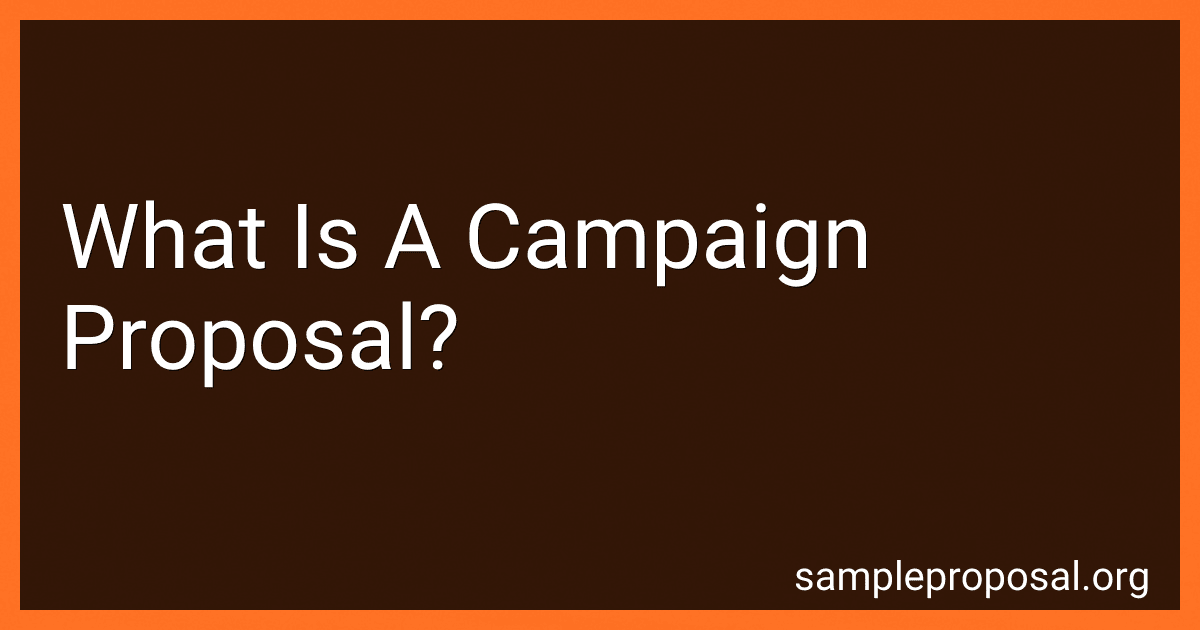Best Campaign Proposal Tools to Buy in February 2026
A campaign proposal is a written document that outlines a plan of action for a specific marketing or advertising campaign. It details the objectives, strategies, tactics, target audience, budget, and timeline for the campaign. The proposal also includes information about the company or organization initiating the campaign, as well as any relevant background research or market analysis. A well-constructed campaign proposal serves as a blueprint for the campaign team to follow and helps ensure that all stakeholders are on the same page regarding the goals and expectations for the campaign.
What is the difference between traditional and digital campaign proposals?
Traditional campaign proposals typically involve physical printed materials such as brochures, flyers, and posters, as well as traditional media channels such as television, radio, and print advertising. They also often incorporate in-person events and other offline marketing tactics.
On the other hand, digital campaign proposals focus on utilizing online channels and platforms such as social media, websites, email marketing, and online advertising. They may also involve the use of digital tools and technologies such as data analytics, audience targeting, and online content management systems.
Overall, the main difference between traditional and digital campaign proposals lies in the mediums and channels used to reach the target audience. Traditional campaigns rely on offline tactics, while digital campaigns leverage online tools and technologies to engage and communicate with the target audience.
How to create a budget for a campaign proposal?
Creating a budget for a campaign proposal involves identifying all potential expenses and estimating the costs associated with each aspect of the campaign. Here are the steps to create a budget for a campaign proposal:
- Identify all potential expenses: Start by listing all the different elements and activities that will be part of the campaign. This could include things like advertising, marketing materials, event expenses, staff salaries, travel costs, and any other items necessary for the campaign.
- Estimate costs for each expense: Once you have identified all the potential expenses, estimate the costs associated with each item. You may need to conduct research or get quotes from vendors to determine the most accurate estimates.
- Create a spreadsheet: Use a spreadsheet or budgeting software to organize your expenses and their corresponding costs. List each expense item in one column and the estimated cost in another column. Total the estimated costs to get an overall budget for the campaign.
- Allocate funds: Determine how much money is available for the campaign and allocate funds accordingly to each expense item. Make adjustments as needed to stay within the budget constraints.
- Monitor and track expenses: Throughout the campaign, keep track of all expenses and compare them to the budget regularly. Make any necessary adjustments to ensure that you are staying within the budget and not overspending.
- Finalize the budget: Once all expenses have been accounted for and the budget has been monitored, finalize the budget for the campaign proposal. Include a detailed breakdown of all expenses and justify each cost to provide transparency and accountability.
By following these steps, you can create a comprehensive and realistic budget for a campaign proposal that outlines all expenses and ensures financial sustainability throughout the campaign.
How to conduct a SWOT analysis for a campaign proposal?
A SWOT analysis is a strategic planning tool that helps businesses and organizations identify their strengths, weaknesses, opportunities, and threats. When conducting a SWOT analysis for a campaign proposal, follow these steps:
- Identify the strengths of the campaign proposal:
- What advantages does the campaign proposal have over competitors?
- What unique resources or capabilities can be leveraged for the campaign?
- What successful past campaigns can be used as benchmarks?
- Identify the weaknesses of the campaign proposal:
- What limitations or challenges does the campaign proposal face?
- What areas need improvement or refinement?
- Are there any internal factors that could hinder the success of the campaign?
- Identify the opportunities for the campaign proposal:
- What trends, market changes, or upcoming events could be leveraged for the campaign?
- Are there any new technologies or tools that could enhance the campaign's effectiveness?
- Are there any untapped markets or audiences that could be targeted?
- Identify the threats to the campaign proposal:
- What external factors could impact the success of the campaign, such as competition, economic conditions, or regulatory changes?
- Are there any potential obstacles or challenges that could derail the campaign?
- Are there any negative perceptions or risks associated with the campaign proposal?
- Analyze the findings and develop strategies:
- Based on the SWOT analysis, prioritize the key strengths, weaknesses, opportunities, and threats.
- Develop strategies to maximize the strengths and opportunities, while minimizing the weaknesses and threats.
- Consider how to mitigate any potential risks or challenges identified in the analysis.
By conducting a thorough SWOT analysis for a campaign proposal, you can better understand the internal and external factors that could impact its success and develop a more effective and strategic plan for implementation.
What is the timeline for a campaign proposal?
A campaign proposal timeline will vary depending on the complexity of the campaign and the specific goals and objectives. However, a general timeline might look something like this:
- Planning and Research (1-2 weeks): This phase involves conducting market research, identifying target audiences, setting campaign goals and objectives, and developing key messages and strategies.
- Creative Development (2-4 weeks): This phase includes the creation of all campaign materials including visuals, copywriting, and multimedia content.
- Implementation (4-12 weeks): This phase involves the actual launch and execution of the campaign, including media placements, social media postings, events, and other promotional activities.
- Monitoring and Evaluation (Ongoing): Throughout the campaign, it is important to track key performance indicators and adjust strategies as needed based on data and feedback.
- Post-Campaign Analysis (1-2 weeks): After the campaign has ended, it is important to evaluate its effectiveness and ROI, gather feedback, and identify areas for improvement for future campaigns.
Overall, a campaign proposal timeline should be realistic and allow for flexibility in case of unexpected delays or changes. It is important to set clear deadlines and milestones to keep the project on track.



